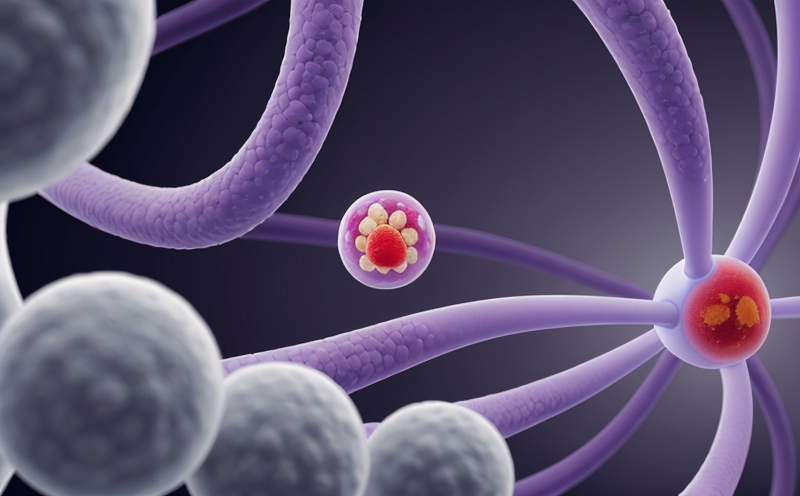Inflammatory Cytokine Biomarker Testing in Cancer Animal Models
Understanding and monitoring inflammatory cytokines in cancer animal models is crucial for advancing our knowledge of tumor biology and developing effective therapeutic strategies. Inflammatory cytokines, such as interleukin-6 (IL-6), tumor necrosis factor-alpha (TNF-α), and interferon-gamma (IFN-γ), play a significant role in the immune response to cancer. These biomarkers can provide insights into the mechanisms of tumor progression, metastasis, and therapeutic efficacy.
At Eurolab, we offer comprehensive inflammatory cytokine biomarker testing services specifically tailored for use in cancer animal models. Our expertise ensures that researchers and pharmaceutical companies have access to accurate and reliable data supporting their studies. We employ state-of-the-art technology and methodologies to ensure precision and consistency in our measurements.
The first step in conducting this type of testing involves selecting the appropriate animal model, which is often chosen based on its genetic similarity to human cancer types or its ability to replicate specific pathophysiological conditions. Common models include syngeneic tumors, xenografts derived from human cancers, and genetically engineered mouse models (GEMMs). Once the model has been established, blood samples are collected at various time points throughout the study to monitor changes in cytokine levels.
Sample preparation is critical for ensuring accurate results. Typically, whole blood or serum is used as starting material. Serum samples require minimal handling and can be stored at room temperature for extended periods before analysis. For whole blood samples, immediate processing is necessary to prevent cellular damage and subsequent release of intracellular proteins that could interfere with cytokine measurements.
Instrumentation plays a vital role in this testing process. We utilize multiplex immunoassay platforms such as Luminex xMAP technology for simultaneous detection of multiple analytes in a single sample. This approach allows for high throughput screening while minimizing the number of samples needed, which is particularly beneficial when working with limited quantities of biological material obtained from animal models.
The analytical methods employed by Eurolab adhere to international standards like ISO/IEC 17025:2017 and follow stringent quality control protocols to ensure reproducibility and traceability. Our laboratory personnel undergo continuous training to stay updated on the latest technological advancements and methodological improvements.
Results from our tests are presented in clear, user-friendly formats that include detailed descriptions of detected cytokines along with their concentrations over time. These reports also contain interpretative comments based on existing literature regarding potential correlations between observed cytokine profiles and clinical outcomes or treatment responses.
By leveraging these advanced testing capabilities, researchers can gain valuable insights into how inflammatory cytokines contribute to cancer progression and identify novel therapeutic targets aimed at modulating the immune microenvironment. This information is invaluable for developing personalized medicine approaches that could ultimately improve patient care by enhancing both diagnosis accuracy and targeted therapy effectiveness.
In summary, Eurolab’s inflammatory cytokine biomarker testing services provide robust tools for investigating complex interactions within cancer animal models. Our commitment to excellence ensures that clients receive reliable data they can trust when making critical decisions about their research projects or drug development programs.
Eurolab Advantages
State-of-the-art technology: Utilizing cutting-edge platforms like Luminex xMAP for accurate and precise cytokine quantification.
- Ensures high throughput while maintaining minimal sample requirements.
- Allows concurrent measurement of multiple biomarkers in a single assay run.
Comprehensive quality assurance: Compliance with international standards including ISO/IEC 17025:2017 guarantees reliability and consistency across all tests performed.
- Incorporates rigorous internal controls to validate analytical methods.
- Includes regular proficiency testing programs to monitor performance against external benchmarks.
Dedicated scientific support: Access to expert consultants who offer guidance on study design, interpretation of results, and integration into larger research initiatives.
Quality and Reliability Assurance
- ISO/IEC 17025:2017 Compliance: Ensures that our laboratory operations meet the highest standards of quality assurance.
- Rigorous Internal Controls: Implemented to validate analytical methods and ensure consistent results across all samples processed.
We continuously strive to maintain these high levels of reliability by adhering strictly to established procedures and protocols. Our commitment to excellence in every aspect of our service delivery is reflected not only in the accuracy of our findings but also in the confidence that clients place in us for their most important projects.
Customer Impact and Satisfaction
- Informed Decision Making: Providing precise data helps researchers make informed choices regarding their experimental designs and interpretations of results.
- Enhanced Drug Development: Accurate biomarker measurements contribute to more effective drug candidate selection and optimization processes during preclinical stages.
The success stories of satisfied clients speak volumes about the value we bring to our partners. By partnering with Eurolab, organizations involved in cancer research can expect not only reliable data but also valuable insights that drive innovation forward towards improved treatments and diagnostics.





